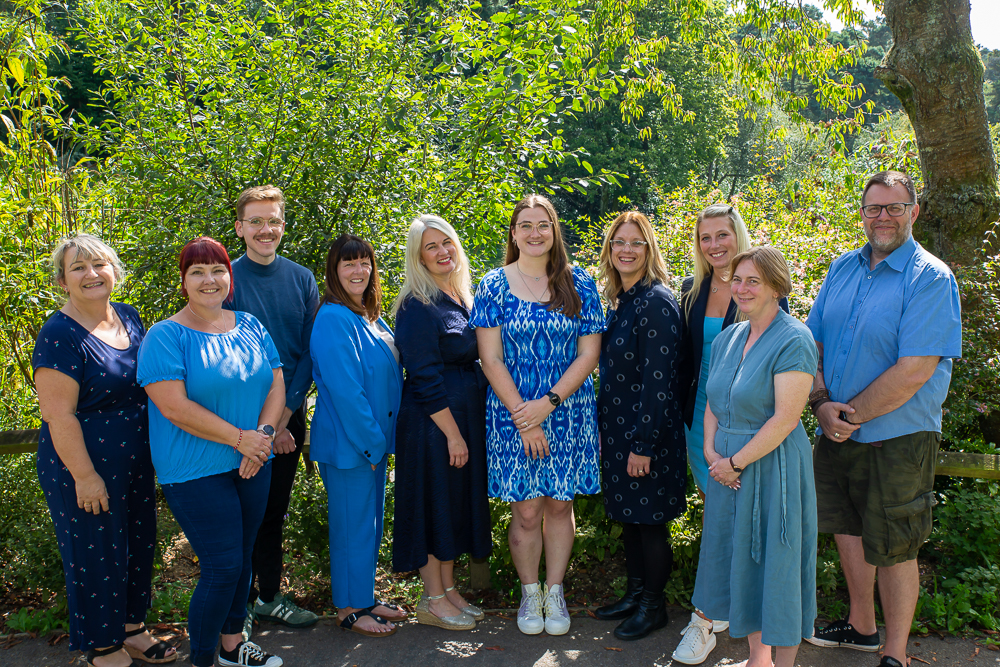Our latest news
Filter
From our gallery
Curriculum
We take an integrated approach to the curriculum at Undershaw with equal importance placed on the academic and skills curriculum. Our aim is for our students to develop a love of learning that will extend far beyond their time at Undershaw and equip them for their lives as independent young adults.
Our curriculum is broad and balanced. It is carefully sequenced to ensure that all students can access and progress through the whole curriculum, regardless of individual need. We encourage hands-on, experiential learning which allows our students to explore and experience ‘real-life’ learning in a range of off-site environments and through thematic and project-based learning.
In Key Stage 4, we offer a range of academic and vocational qualification pathways at Levels 1 and 2. We provide students with exciting opportunities to further develop their independence skills, preparing them for their next steps in education or employment.
In Post 16, we focus on employability and independence skills through a Level 3 course, to prepare our students for FE college, apprenticeship or internship, or employment. Work experience, travel training and independence skills are all integral to Post 16 learning, alongside the continued development of academic skills through the Higher Project Qualification (HPQ).

The Undershaw Curriculum
For further information please contact the Deputy Headteacher (Academic).
Curriculum Pulse Autumn 1 2024
Curriculum Pulse Autumn 2 2024
English
Underpinning the Undershaw Curriculum, Literacy and Oracy provide the essential skills for independence and success in the modern world. Through the encouragement of independent thinking, written and oral communication, along with reading for pleasure, students gain the confidence to thrive in a variety of situations. Though our spiral curriculum, where key skills are revisited throughout Key Stages 2 – 4 and Post 16, students have the opportunity to refine their skills and develop their accuracy, fluency and independence as they mature. At Key Stage 2, thematic learning enables students to practice different types of writing, alongside guided reading sessions to develop key skills in understanding vocabulary, inference, prediction, retrieval and summary. Read, Write Inc builds on phonic knowledge to allow our students to access the wider curriculum. At Key Stage 3, students gain a broad and balanced English curriculum, revisiting reading and writing skills to develop accuracy, style and presentation. Oracy is developed through discussion and more formal presentations. Whilst following the examination syllabi at Key Stage 4, students are encouraged to develop their skills by providing greater analysis of texts and using writers’ techniques in their own extended work. Whilst encouraging success in the key writing skills, real world experiences are fundamental to the individual’s experience of English at Undershaw as they head through to Post 16. Skills Builder is integrated into the English Curriculum, through core skills, including Speaking, Listening, Creativity and Teamwork. Our aim is to equip students with the skills to succeed as they progress through their education and to gain employment, whilst also inspiring curiosity, developing empathy, valuing other cultures and broadening their experience of the world through a shared love of literature.
Maths
Mathematics has developed over time as a means of solving problems, staying positive and as a form of communication. The language of mathematics is international and can break down boundaries. In teaching maths, we develop skills that are essential to independent living and employment in later life; a numerical fluency will empower our students to connect to the world of tomorrow and manage their own personal finances. Students who are functional in mathematics can apply their skills to a boundless array of real-world challenges to come up with both abstract and logical solutions. Our overarching goals and individually tailored curriculum using effective differentiation to enable each student to enter the wider world with confidence.
In mathematics we have an ambitious, coherently planned and sequential curriculum. Students aim high to achieve their best and we foster a culture of resilience. This ensures all students acquire their skills confidently. Underpinning all lessons, students will have a deep understanding of Mathematical concepts and build their resilience with support.
In Key Stage 2 the focus is on developing numeracy using visual and concrete methods to support strong connections. In Key Stage 3 students continue to build on the methods of Key Stage 2 and for students who are ready can move onto more abstract Mathematical skills. Additionally in Key stage 3 there is a broadening of the topics to include shape, data and algebra, which continues Into Key Stage 4 and Post 16. We then complete terminal examinations to ensure students are ready for their next steps. In all Key Stages we use manipulatives where appropriate to support students learning and link physical objects to the abstract concepts and processes.
Science
Our science curriculum provides the foundations for understanding the world around us. Science changes our lives, and we ensure our students are fully equipped with the scientific knowledge required to understand the uses and implications of science, today and for the future. They are encouraged to develop their understanding of how science can be used to explain what is occurring, predict how things will behave, and analyse causes. The Science curriculum is designed to build knowledge, to inspire curiosity in students so that they actively seek to be able to explain phenomena in the world around them, using discoveries made by scientist’s past and present. Within the teaching of Science, the Undershaw Teaching and Learning principles are embedded alongside pedagogy distilled from evidence-based research. Starting from Key stage 2 there is a focus on working scientifically and using practical based investigations to illustrate scientific ideas and concepts with the demand for Scientific reasoning developing across the key stages. Within the curriculum we endeavour to develop a strong understanding of Scientific vocabulary which students are regularly challenged to use; this begins at Key stage 2. Throughout the curriculum students are exposed to all areas of science across biology, chemistry and physics with some of these topics being explored through project-based learning opportunities and others through lab-based investigations, the students also have the opportunity to achieve certificates for a variety of short courses. The Science curriculum aims to build on students understanding and topics are revisited at each key stage with greater depth and challenge in preparation for the end point at KS4. Students will develop a variety of life skills through these practical investigations such as, weighing things, measuring and pouring liquids and handling hot equipment they will also develop an understanding of potential hazards and how risk can be minimised. Embedded across all our teaching are the 8 key skills which students have many opportunities to use such as teamwork for project-based work, creativity for designing investigations and problem solving for STEM based tasks.
Humanities
Our Humanities curriculum is built with the aim of developing our students’ appreciation of both themselves and the wide world. We want students to be inquisitive about who we are, where we come from and where we might be going. We study a range of societies, from both the past and the present, to develop student understandings of the variety of human lives, cultures, and ways of living. We want all our students to live independent lives and enter employment – through our Humanities curriculum we aim to develop our students’ critical thinking skills and their ability to articulate their views, providing them with the confidence to enter the workplace and engage in life-long learning.
Computer Science
Computer Science equips our students to use computational thinking and creativity to understand and change the world. Computing has deep links with mathematics, science, and design and technology, and provides insights into both natural and artificial systems. With our all-through curriculum from KS2 – KS5 at Undershaw pupils are equipped to use information technology to become digitally literate – able to use and build digital resilience and independence. To learn how to problem solve using critical, logical, and creative thinking and to encourage curiosity in communication to express themselves and develop their ideas.
Physical Education
We understand the benefits of physical activity has towards our students both physically and mentally. Movement and exercise are the key to ensure students are regulated and maintain good wellbeing. We offer weekly Physical Activity lessons to all students to ensure that we can meet the demands and with a curriculum that suits their needs. Offering a range of different sports and activities to ensure that students have opportunities to thrive in any sport. Working on key social skills such as teamwork and staying positive will have an influence on them that they can take into future life. Offering a structured sports timetable for both breaks and lunchtimes allows students to have a clear focus on a sport at these times and to be able to trial new sports throughout the academic year. In the Post 16 years we welcome personal training into the curriculum to support the students in keeping themselves active and promoting their own healthy lifestyle.
Personal Growth
The very nature of Personal, Social, Health and Economic Education (PSHE) is that it builds upon the skills and knowledge learnt throughout school and the wider world of the student. It aims to draw on elements of their own experiences to empower students to flourish, adapt and succeed. Our PSHE curriculum will give pupils the knowledge, skills and understanding they need to lead confident, healthy, and independent lives. It will help students to become informed, active, and responsible citizens, capable of forming good relationships and respecting the differences between people.
Employability and Life Skills
Our philosophy begins with the end in sight. We focus on developing all the skills necessary for living an independent and fulfilling adulthood. We hope to light the fire of aspiration by bringing Employability skills to life, inspiring our young people to set goals and equip them with the experiences and knowledge needed to achieve them. We are passionate about our young people being given the opportunity to reach their full potential and transition confidently from education into full time paid employment.
NOAH (Nature, Outdoors, Animals and Health)
The NOAH faculty extends beyond the academic curriculum and offers opportunities for students to engage with the outdoors and animals, for example through Forest School sessions and animal experiences on discovery days. This enables students to practice their soft skills in a different context, including team building and leadership skills, working with their peers in an environment outside of the classroom. Students benefit therapeutically from engaging with the animals or the sensory environment in Forest School. The students will also learn about the environment, sustainability, and the value of social responsibility. Our extensive discovery day program offers an outdoor option which gives students a deeper overall connection to nature and grounding to their local environment. During ‘Outdoor skills’ sessions, students can work towards additional AQA short courses giving students recognised accreditations whilst exploring their outdoor journey.
Forest School
We are so lucky to have a wonderful Forest School provision at Undershaw. We are able to offer weekly sessions to all Key Stage 2, Key Stage 3 and post 16 students and each session is led by a qualified Level 3 Forest School Leader. Forest School is a child-centred inspirational learning process that offers all learners regular opportunities to develop confidence and self-esteem via hands-on learning experiences in a woodland or natural environment. Using the six principles of Forest School, we offer a long-term program that supports play, exploration and supported risk-taking. Children who may struggle to learn in the classroom are enabled to develop new ways of learning, achieving, and coping with the world and the indoor classroom environment. Working alongside the pastoral team we offer individual students needing increased support half termly additional Forest School / Woodworking sessions. This gives students the opportunity to achieve a wide range of accredited AQA short course awards, develop positive self-esteem and support their overall physical and mental wellbeing.
Music
Music is at the heart of Undershaw. We are a school that is bursting with musical talent, and we are extremely proud of all that our young musicians achieve.
Music can transform the way we feel, and it brings us together in a way nothing else can. It is a universal language central to cultures around the world. Studying Music develops our ability to solve problems, our emotional insight, and our ability to work with others. Making music develops our linguistic skills, memory, coordination, helps develop pattern recognition, our emotional development, and our creativity. All of our students have the opportunity to learn an instrument or join a Music club. All our KS3 students have regular Music lessons in which they learn the core musical skills they need to progress to KS4. Every scheme of work encourages students to develop their confidence, creativity and musicality through performance and composition, listening critically to other students and accepting constructive criticism themselves.
In GCSE Music, the course is tailored to the individual interests and learning styles of each student. The all-through music curriculum encourages students to value working together, to appreciate one another and to develop an appreciation of the work of musicians, composers, and performers from history and from around the world. It gives all our students the opportunity to take risks, to reflect and to build self-confidence and self-esteem, preparing our students for the creative economy of the 21st century.
Drama
Creative skills are needed to be successful in an ever-changing job market. Drama aims for all students to develop a creative and collaborative mindset. Students work on developing their communication, collaborative, self-management and creative thinking skills, alongside technical performance skills. Confidence is also important in students being able to share their ideas with others using a variety of mediums: writing scripts; directing others; or in performance to their peers. Drama also offers students the opportunity to develop their cultural capital and empathy for others. In preparation for further study, students also explore a variety of drama techniques, theatre, and drama styles such as Melodrama and Physical Theatre. We hope that every student will find an area of drama that they are passionate about. Students can develop their own ideas as well as exploring scripts from a range of times and cultures. Students also build their analysis and evaluation skills in being able to look at their own and others work critically.
Art
Art has the power to transform our young people’s experience of school and their self-confidence. Our ambition of the Art and Design Curriculum at Undershaw is to give our students the opportunity to think imaginatively and creatively in a safe environment, whilst also equipping them with the skills to communicate visually in a range of materials and processes. Alongside this, the all-through curriculum is structured to allow every student to have a safe space they can succeed creatively and continually grow as a resilient, creative individual with a continued focus on developing their growth mindset and expanding their educational cultural capital. With student-centred learning we aim to provide an inclusive curriculum for Art and Design which aims to realise the full creative potential of all students to become independent creative practitioners. Developing core practical skills and critical understanding of artworks, whilst continually building on prior skills and knowledge, allows students at Undershaw to continually see success in themselves, from the beginning of their Art and Design journey in KS2, through KS3, KS4 and to post 16. At Undershaw the Art and Design curriculum is sequenced to ensure all students can succeed and are proud to share their achievements, these are celebrated in our end of year Art exhibition, project-based learning (PBL) end points and on display around the school. In their Art lessons students are introduced to a wide range of processes and subjects, including landscapes, portraits, recycled group sculpture, printing, photography, textiles and painting. The curriculum supports students’ development of their fine motor skills, creativity, resilience, problem solving skills and their ability to work in a wide variety of media and processes. Within each project, students work in response to a theme, artist or art movement, enabling them to broaden their artistic knowledge and their ability to develop ideas when a clear brief is given, preparing them for BTEC in year 10 and 11. Art and Design supports and equips students with the safe space and guidance they need to develop their soft skills throughout their education that they need to thrive beyond the school gates.
Qualification Pathways
The qualification pathways are designed to ensure that every student experiences success and may include GCSE, Entry Level Certificate, BTEC or other qualifications, depending on the needs of the individual. Please click here for our explanatory visual.
We deliver our broad curriculum through our daily lesson blocks, the overall structure of our school day, and our weekly Discovery Days. Please see the links below for more information on how we shape our Undershaw provision.
Our Discovery Days






